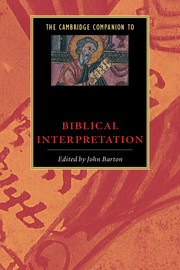Book contents
- Frontmatter
- Introduction
- Part 1 Lines of approach
- 1 Historical-critical approaches
- 2 Literary readings of the Bible
- 3 The social world of the Bible
- 4 Poststructuralist approaches New Historicism and postmodernism
- 5 Political readings of Scripture
- 6 Feminist interpretation
- 7 Biblical studies and theoretical hermeneutics
- 8 The Bible and Christian theology
- 9 Biblical study and linguistics
- 10 Aspects of the Jewish contribution to biblical interpretation
- 11 The Bible in literature and art
- Part 2 Biblical books in modern interpretation
- General Index
- Index of Biblical References
6 - Feminist interpretation
from Part 1 - Lines of approach
Published online by Cambridge University Press: 28 May 2006
- Frontmatter
- Introduction
- Part 1 Lines of approach
- 1 Historical-critical approaches
- 2 Literary readings of the Bible
- 3 The social world of the Bible
- 4 Poststructuralist approaches New Historicism and postmodernism
- 5 Political readings of Scripture
- 6 Feminist interpretation
- 7 Biblical studies and theoretical hermeneutics
- 8 The Bible and Christian theology
- 9 Biblical study and linguistics
- 10 Aspects of the Jewish contribution to biblical interpretation
- 11 The Bible in literature and art
- Part 2 Biblical books in modern interpretation
- General Index
- Index of Biblical References
Summary
'It might be interesting to speculate upon the probable length of a “depatriarchalized Bible”. Perhaps there would be enough salvageable material to comprise an interesting pamphlet.' Thus Mary Daly in 1973, sharply engaged with feminist interpretation in its early stages. Roughly twenty-five years later, feminist interpretation flourishes whether inside or outside the academic community where there are feminists qualified and interested enough to engage in it, with some of it undertaken by Jewish and Christian writers together, focusing on women and the gender symbolism of the Hebrew Bible. This chapter, however, engages with feminist Christian interpretation of the Bible as a whole (with some reference to the Apocrypha). Feminist interpretation is here understood as presupposing that the Bible is still read and heard and preached as an authoritative text in communities of belief and worship. And 'authoritative' here means that by using reason, imagination, historical insight, reflection on human experience and whatever other resources we can muster, the Bible somehow mediates to us a God who enables human beings to be most fully themselves. And there's the rub, for feminists at least. Mary Daly's sharp comment has its point.
- Type
- Chapter
- Information
- The Cambridge Companion to Biblical Interpretation , pp. 81 - 94Publisher: Cambridge University PressPrint publication year: 1998
- 1
- Cited by



